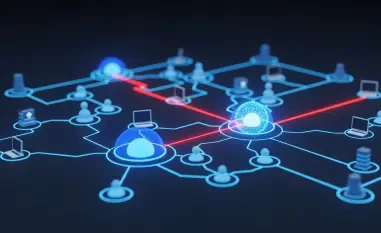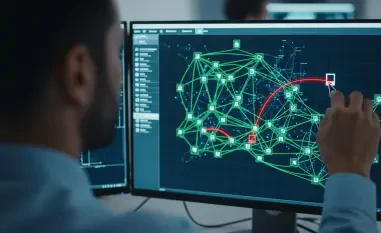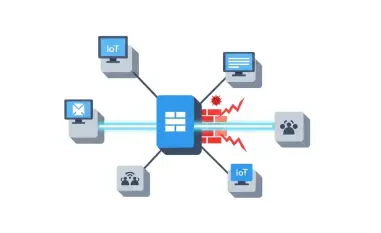Artificial intelligence (AI) has revolutionized various industries by enabling unparalleled advancements; however, its penetration into the digital world has also ushered in sophisticated cyber threats. According to a Gartner survey conducted among 286 senior enterprise risk executives, AI-enhanced malicious attacks and AI-assisted misinformation campaigns remain at the top of the list of emerging risks for the third consecutive quarter. Approximately 80% of the respondents identified these issues as a major emerging risk, underscoring a consensus on the growing sophistication and frequency of such threats. The disconcerting factor is that as AI tools become more accessible, cybercriminals are using them to carry out more sophisticated attacks that are harder to detect and mitigate. Thus, organizations increasingly need to defend themselves against AI-based cyber-attacks, which requires not only advanced technological solutions but also highly skilled professionals.
The Rising Sophistication of AI-Based Attacks
AI-based cyber-attacks pose a significant threat due to their increasing complexity. With the ability to automate and enhance traditional attacks, AI allows cybercriminals to launch large-scale phishing campaigns and execute sophisticated malware at an unprecedented scale. This rise in sophistication is a primary concern flagged by senior enterprise risk executives in the Gartner survey. Additionally, AI’s capability to adapt and learn from defense mechanisms makes these attacks more effective in bypassing traditional security measures. Such malicious software can evolve and improve, creating an ever-changing landscape of threats that is challenging for companies to counteract.
The employment of AI to spread misinformation further complicates the threat landscape. Foreign adversaries like Russia, China, and Iran have been identified as attempting to use AI-generated content to manipulate public opinion, especially during critical events like the U.S. presidential election. AI’s power to create convincing fake videos, audio, and news can exacerbate social and political instability. The dual risk of sophisticated cyber-attacks and AI-assisted misinformation underlines the necessity for robust security measures and the expertise to implement them, highlighting the need for a proactive approach in dealing with these AI-based threats.
Talent Shortage in AI and Cybersecurity
A significant challenge in combating AI-based cyber-attacks is the shortage of skilled professionals in AI and cybersecurity fields. Companies are finding it increasingly difficult to source talent capable of understanding and countering these sophisticated threats. Zeus Kerravala, a principal analyst with ZK Research, emphasizes that fighting AI cyber threats requires leveraging AI itself; however, many organizations lack the requisite resources and skills to do so independently. This shortage is not only a barrier to deploying effective defense mechanisms but also hinders the development of innovative solutions to stay ahead of cybercriminals.
The typical solution proposed to address this gap is partnering with Managed Security Service Providers (MSSPs) and Managed Service Providers (MSPs). These specialized providers possess the expertise and resources necessary to offer comprehensive cybersecurity solutions, including AI-enhanced security tools. MSSPs can effectively support companies that struggle to manage their cybersecurity needs alone by providing the required AI capabilities and expert knowledge. This collaboration allows organizations to fortify their defenses against evolving threats, ensuring their security measures are adaptive and resilient.
The Role of MSSPs in Enhancing Cybersecurity
Managed Security Service Providers (MSSPs) are uniquely positioned to mitigate the risks posed by AI-based cyber-attacks. Their extensive knowledge in both AI and cybersecurity allows them to offer tailored solutions that address the specific needs of various organizations. The integration of AI into their services enhances their ability to detect, respond to, and neutralize threats effectively. Moreover, MSSPs provide continuous monitoring and updates, ensuring that security measures evolve in sync with the changing threat landscape. This proactive approach is crucial given the rapid pace at which AI-enhanced threats develop and adapt.
An OpenText survey of 1,500 MSPs and MSSPs highlighted the growing significance of AI-led security and threat intelligence services. Most respondents viewed AI security tools as a primary driver of growth, with many already incorporating AI into their offerings. This consensus underscores the critical role MSSPs play in enhancing an organization’s cybersecurity. By leveraging AI, MSSPs help organizations automate threat detection processes, predict potential threats, and develop adaptive defense mechanisms. These capabilities are invaluable in an era where traditional security measures alone are insufficient to combat sophisticated AI-based attacks.
Conclusion
A major hurdle in tackling AI-based cyber-attacks is the shortage of skilled experts in both AI and cybersecurity. Companies are increasingly finding it challenging to recruit talent capable of understanding and neutralizing these complex threats. Zeus Kerravala, a principal analyst with ZK Research, highlights that combating AI cyber threats necessitates the use of AI itself; however, many firms lack the necessary resources and skills to implement these defenses independently. This shortage not only impedes the deployment of effective security strategies but also hinders the innovation required to stay ahead of cybercriminals.
To bridge this gap, partnering with Managed Security Service Providers (MSSPs) and Managed Service Providers (MSPs) is often recommended. These specialized providers have the expertise and resources to deliver robust cybersecurity solutions, including AI-enhanced security tools. MSSPs can assist companies that struggle to manage their cybersecurity on their own by supplying the needed AI capabilities and expert knowledge. This collaboration enables organizations to strengthen their defenses against evolving threats, ensuring their security measures remain adaptive and resilient.













